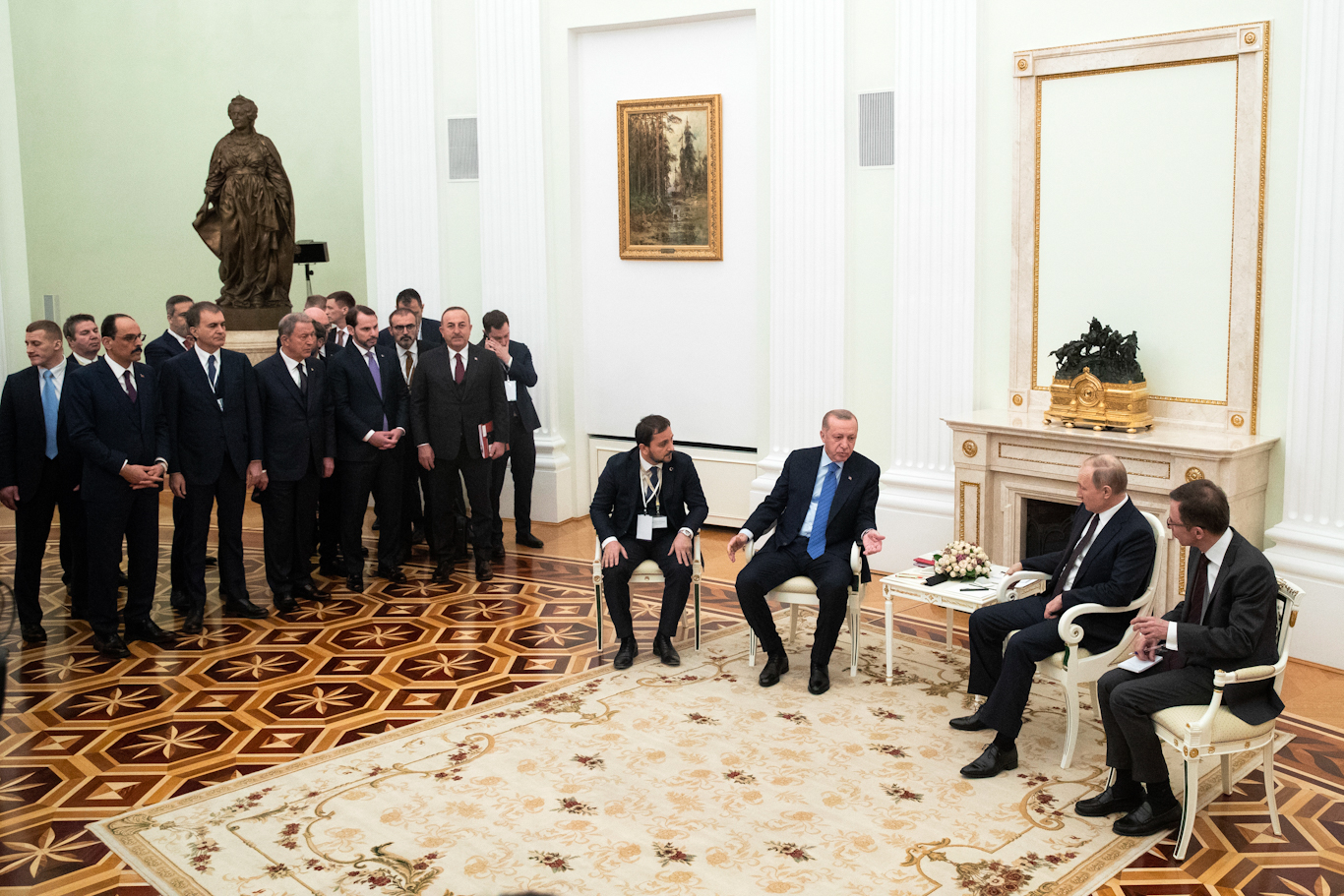Even when viewed through the prism of Turkish interests, President Tayyib Erdogan’s escalatory actions in Syria’s Idlib governorate constitute now plainly evident blunder. Refusing to finally abandon its occupation of Idlib has so far produced numerous setbacks for Turkey, visible to all but the brashest of Erdogan’s diehard supporters. It also threatens to damage Turkey’s ability to leverage its ties with numerous foreign powers that enable it to invest in its overseas adventures in the first place.
Turkey deployed large numbers of troops and artillery to Idlib to fight the Syrian Arab Army (SAA) as it began operations in February to retake Idlib while colluding with the a-Qaeda-linked terrorist group, Hayat Tahrir al-Sham (HTS). With a Russian no-fly zone imposed over Idlib and strong Russian aerial support and material supplies, the SAA moved on Idlib with the goal of destroying HTS. The Turks subsequently lost ground and Erdogan hurriedly sought Russia’s assistance for a ceasefire.
As noted by Turkish analyst Cengiz Candar, Erdogan was clearly the junior partner in the equation as he failed to secure a visit from Russian President Vladimir Putin to Turkey and was instead received in Moscow in a rather humiliating fashion:
The most striking humiliation of the Turkish guests appeared in the choreography of the meeting. Footage showed the crowded Turkish delegation standing under an imposing statue of Catherine the Great, the Russian empress who annexed Crimea from Ottoman Turkey in 1783 and defeated the Ottomans several times in the Russo-Turkish wars in 1768-74 and 1787-1792. To add insult to injury, Erdogan was seated next to Putin under a bronze sculpture of Russian soldiers of the fateful Russian-Turkish War that ended in Ottoman Turkey’s defeat in 1878.”
The ceasefire terms Erdogan finally obtained from Putin during his March 5 visit were a far cry from the first major Erdogan-Putin brokered ceasefire in Idlib, the Sochi Agreement inked in September 2018. While the Sochi Agreement had de facto allowed Turkey to maintain forces inside Idlib, neither Sochi or the March 5 ceasefire entailed or was followed by tangible steps that would ensure Turkey rid Idlib of terrorist groups such as HTS. In fact, the March 5 ceasefire forced Turkey to swallow some bitter pills.

Putin, second from right, and Erdogan, center, talk during their meeting in the Kremlin during the March 5, 2020 meeting in Moscow. Pavel Golovkin | AP
The ceasefire, which began in earnest on March 6, did not address the issue of the Turkish military observation posts that found themselves surrounded by the SAA’s advance. This effectively left their fate in the hands of their enemy. While Turkey can leverage Russia to oversee the continuation of supplies to these posts, their stranded status itself marks another Turkish failure in Idlib.
Additionally, the ceasefire terms imposed by Russia meant that Erdogan’s previously-successful tightrope act of using militant extremists (such as HTS) as proxies while continuing to have de-facto Russian acquiescence to extended Turkish military presence in Syria, was no longer tenable. It did this by declaring four-mile deep security zones to be jointly patrolled by Turkish and Russian forces to the north and south of the vital M4 Highway, leaving Erdogan with an easy choice: foster terrorists within the same vicinity as Russian forces and severely antagonize a vital partner state or remove them from the zones.
As noted by al-Masdar News, the deal allowed Syria to keep the ground it gained and paved the way for the eventual liberation of the M4 Highway from terrorists without Turkey intervening to protect them. Syria already liberated another vital road, the M5 Highway, prior to the ceasefire and maintained control of it.
That the deal represented Russia punishing Turkey, even if without drastic measures, for pushing the envelope too far vis a vis its actions inside Syrian territory exemplifies the extent of Turkey’s blunders in Idlib. This is because Russia, even after Erdogan’s constant disregard for the Sochi Agreement’s terms regarding terrorist groups, tended to cooperate with Turkey a great deal in Syria.
The Ill-conceived Idlib adventure damages Turkey’s credibility
A key example of such generous Russian assistance to Turkey was the October 22, 2019, Putin-Erdogan Memorandum of Understanding (MoU). The MoU ended Turkey’s successful Operation Peace Spring that month against its Kurdish enemies who were entrenched with U.S. support in northeastern Syria. It also ‘legitimized’ Turkey’s military presence in the areas consolidated by granting it a 32-kilometer deep safe zone. The Kurds were also mandated to be disarmed and incorporated into the Syrian military, over which Russia possesses considerable leverage.
Russia is unlikely to try to force an abrupt Turkish withdrawal, but it has clarified to Erdogan that his Idlib policies are an irritant in Russia-Turkey ties.
The United States – who Turkey’s operation successfully forced to make the tactically-easy choice to abandon the landlocked ethno-secessionist Kurds of the ‘Syrian Democratic Forces’ in deference to NATO member Turkey – approved the MoU’s status quo. However, Turkey remained well aware of the increasingly anti-Turkish Congress heatedly opposing the operation due to support for the SDF by Israel and its powerful U.S. lobbyists, giving Erdogan even more reason to view Russia as a partner.
The most striking example of Russia’s accommodation of Erdogan’s ambitions was the MoU indirectly greenlighting his plans to demographically engineer northeastern Syria away from a Kurdish majority. It did so by affirming Turkey’s ‘right’ to resettle Syrian refugees in Syria without demarcating a specific area for this important function, leaving the choice to Turkey.

Syrian refugees travel en masse through the town of Hazano in Idlib province, Jan. 27, 2020. Ghaith Alsayed | AP
Erdogan with his latest actions thus irritated a vital partner, making himself look even worse in the process with erratic requests to the U.S. and NATO for assistance. The latter’s assistance came in rhetoric only, dismissing any prospects of intervention on Turkey’s behalf in Idlib.
The Idlib fiasco has, however, confronted Turkey with more than just lessons on the pitfalls of investing in dangerous foreign policy ventures based on an over-estimation of its own power. It has confronted the uncomfortable Turks with a much broader, deeper lesson: that opportunities presented to them by malignant foreign powers to gain military, economic and strategic hegemony at the expense of neighboring states will ultimately lead to their own isolation and downfall and that coexistence with neighboring states in defiance of such tempting opportunities is in Turkey’s best interest.
Why Turkey’s own interests demand peace with Syria
This lesson, in fact, was alluded to relatively recently by Syrian President Bashar al Assad, who reasonably stated in an interview on March 4 that socio-cultural factors made Turkey and Syria’s nations share ‘brotherly’ ties. Assad reiterated his past stance that conflict between Turkey and Syria – and Turkey’s military presence in Syria – was pointless.
But will Turkey embrace this understanding or eschew it? Whatever path it chooses, there seems due to be due recognition and acknowledgment among Turkey’s policymakers of recent events in Idlib as marking a turning point in Turkey’s regional posture and foreign relations.
On this note, Turkish strategic analyst and former military advisor Metin Gurcan asserts that the tumult in Idlib has brought Turkey to a crossroads in its geostrategic orientation. According to Gurcan, powers in Turkey have split with regard to Turkey’s path forward after the events in Idlib and a ‘moment of truth’ is approaching regarding choosing whether Turkey embraces neighborly coexistence or continued conflict:
The choice they face is not an easy one. Continued alignment with the Russian-Iranian axis dictates reconciliation with Assad in northern Syria, while opting for collaboration with the US-Israeli axis would require Turkey to soften its hard-line stance on the PKK-affiliated YPG. By relying on its own military capacity, meanwhile, it would run the risk of showdowns with Washington, Moscow, Tehran and Damascus on the battlefield.”
A Turkey which has adequately learned its lessons from Idlib will not see reconciliation with Assad as a caveat in embracing regional powers such as Iran and Russia, which lack the appetite for conflagration in Syria that the U.S. and Israel do. It will, in fact, withdraw from all Syrian territory as been all-too-prudent since Turkey dismantled the only understandable threat to its security in the form of the Kurdish contras in October of last year. Turkey needs cordial ties with Syria’s allies in Russia and Iran, both of whose highly differing reasons for supporting Damascus intertwine at the consensus on the need to rid it of extremist terrorists which Turkey has seen for too long as proxies.
Turkey’s ties with the powers that have facilitated the ravaging of Syria by war and terrorism already exhibited a clear downward trend. With regard to the U.S., Erdogan cannot – as some in Turkey hope – leverage his personal rapport with U.S. President Donald Trump enough to overcome the rising anti-Turkey sentiment in the U.S. Congress and media.
Turkey’s dreams of joining the European Union (EU) can also be said to be dead, especially after Erdogan took to utilizing the threat of launching refugees at EU shores for the EU’s perceived intransigence toward his interests and demands in Syria.
Russia and Iran thus assume heightened importance for a Turkey driven by rationality and not hot-headed power-grabs such as in Idlib, which they both disapprove of. Russia has proven an efficient means for Turkey to hedge its bets when greeted with indifference from the West and Turkey has availed it as such amply in the past, going through with joint ventures opposed vehemently by the U.S., such as the purchase of Russian S-400 surface-to-air missile systems and economic projects such as the TurkStream gas pipeline.
Iran, for its part, is beginning to be seen by Turkey as a means of responding to the downward trends in Israel-Turkey ties, albeit in a less visible manner than Russia has in regards to the U.S. and EU. Just as Turkey and Israel experience a ‘falling out’ over issues ranging from dominance over Eastern Mediterranean gas reserves to the Israeli alliance with the anti-Turkish Gulf Arabs (GCC) and the rival factions Turkey and Israel back in the Libyan Civil War, Turkey can be seen developing a closer understanding with Iran on these very issues.
Turkey would serve both itself and the region better if it were to acknowledge Assad’s view of the Turkish and Syrian peoples having no genuine quarrels with each other and scale back its concept of Turkish interests which involve creating such quarrels. If anything, Turkey should withdraw from Syria and concentrate efforts toward Libya, where the UN-recognized Government of National Accord controls less territory than the Israeli-GCC backed warlord, General Khalifa Haftar, and is economically and militarily weaker.
If, however, it continues to escalate matters in Idlib, where terrorists have not respected the March 5 ceasefire, Turkey will erode its ties to both Russia and Iran. Its own case in Libya will weaken and it will find itself not only back in the U.S. and Israeli camp, but actively over-reliant on it. In view of all these factors, Erdogan would do well to interpret Assad’s comments on Syrian-Turkish relations as an invitation toward better ties and accept it enthusiastically.
Feature photo | Graphic by Claudio Cabrera
Agha Hussain is an independent researcher based in Rawalpindi, Pakistan. He specialized in Middle Eastern affairs and history and is an editorial contributor to Eurasia Future, Regional Rapport and other news outlets. Read more of his work on his personal blog.
The post Erdogan’s Idlib Misadventure: Reality Checks and Hard Lessons for Turkey appeared first on MintPress News.
